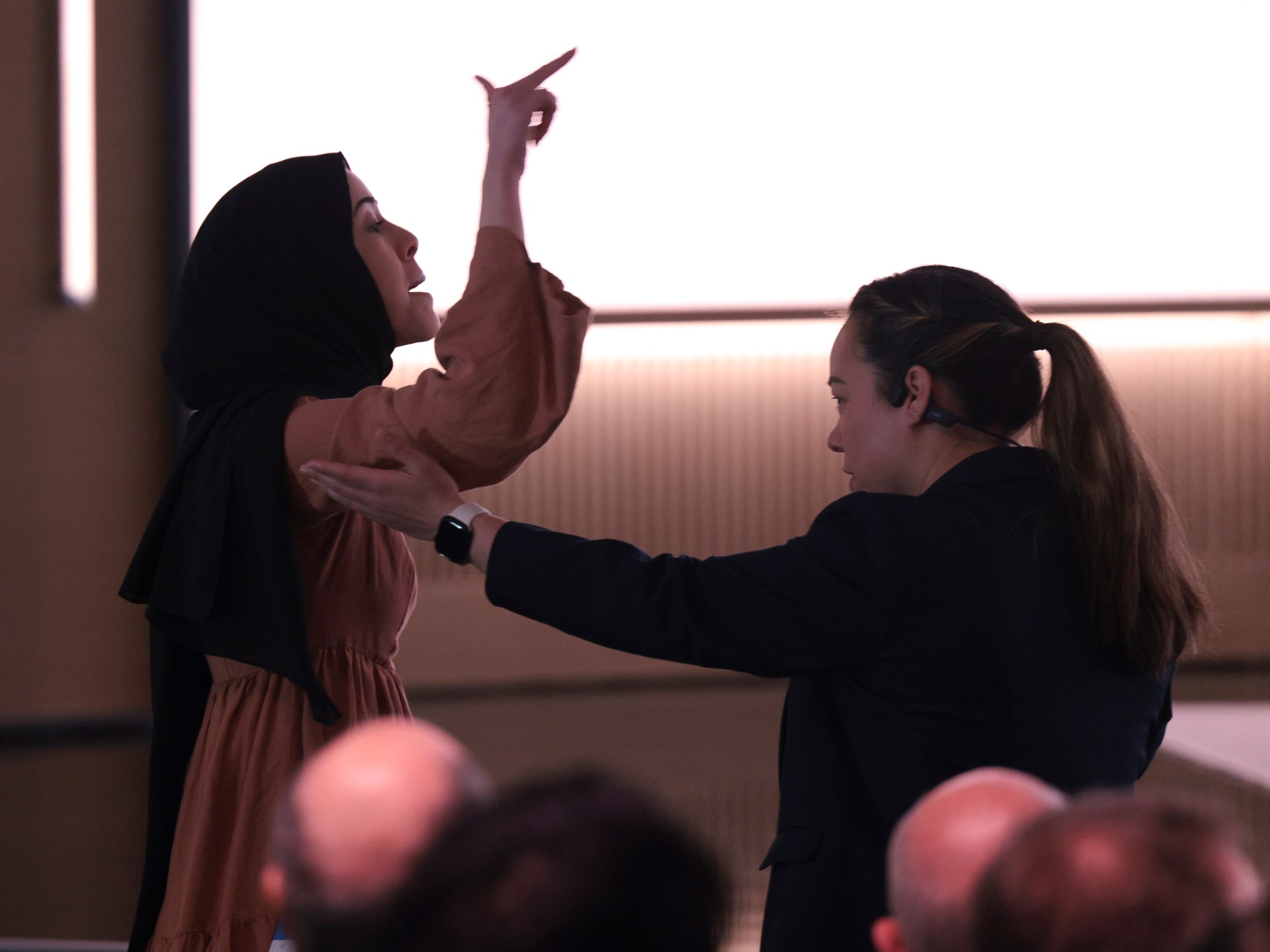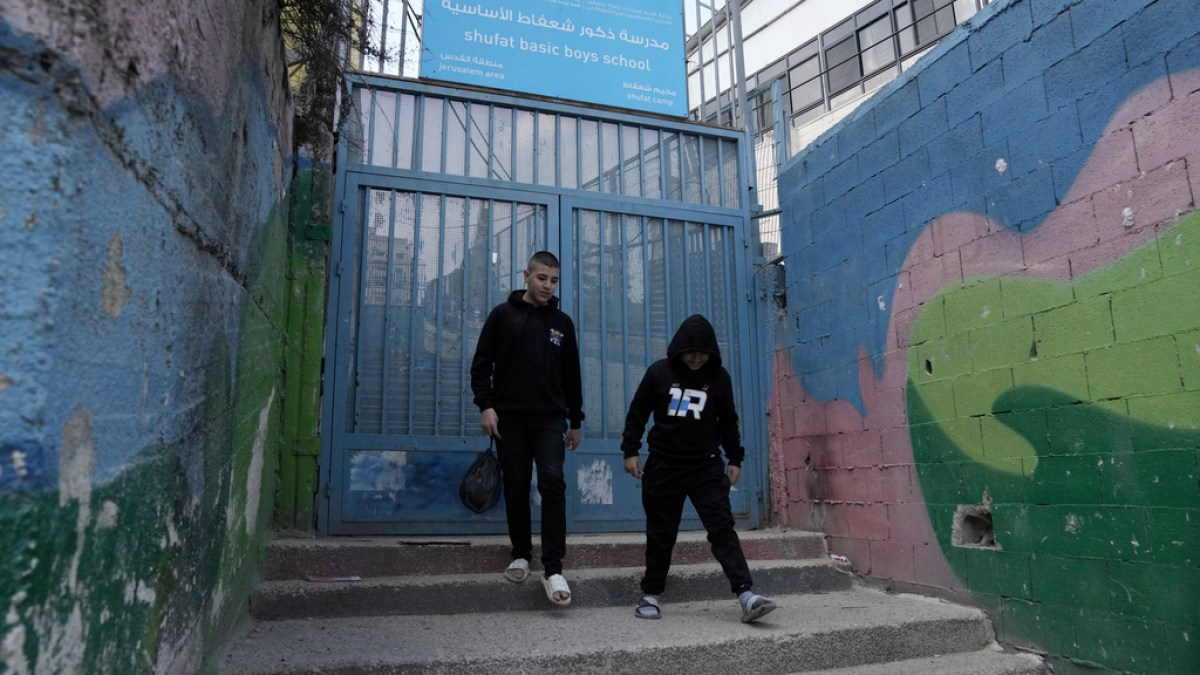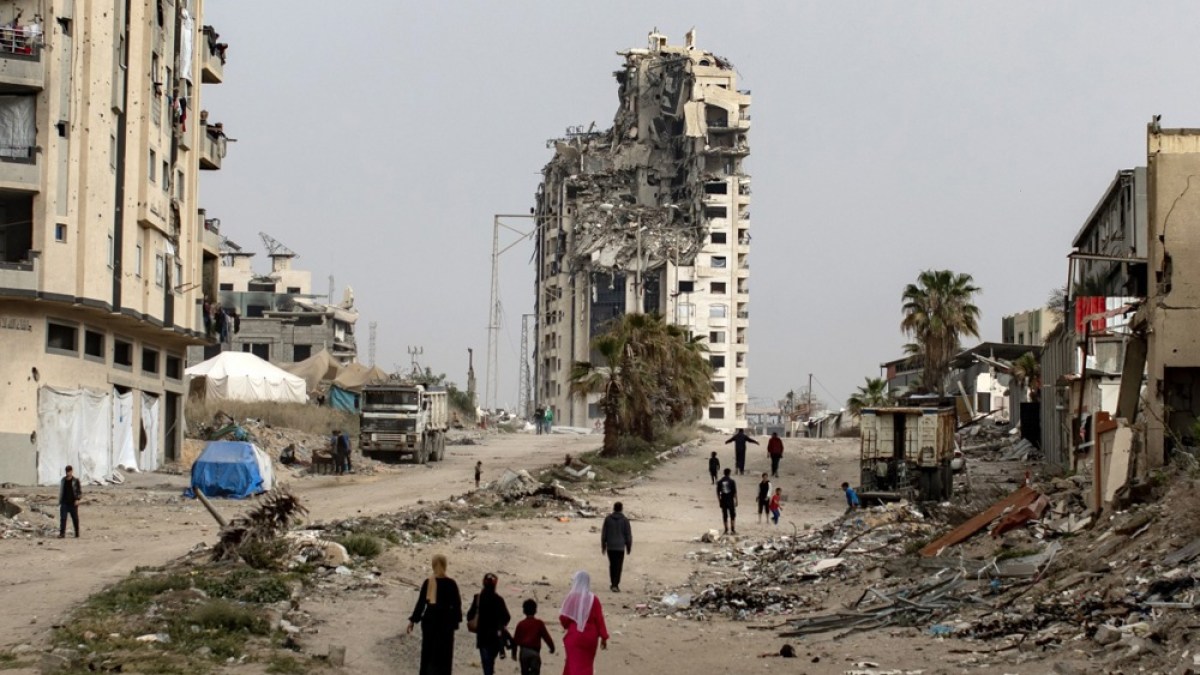Middle East
Pro-Palestinian protesters interrupt Microsoft’s 50th anniversary event | Israel-Palestine conflict News

Reports say AI models from Microsoft were used as part of an Israeli military programme to select bombing targets in Gaza.
A pro-Palestinian protest by Microsoft employees has interrupted the company’s 50th anniversary celebration, the latest backlash over the tech industry’s work to supply artificial intelligence technology to the Israeli military.
The protest began on Friday as Microsoft AI CEO Mustafa Suleyman was presenting product updates and a long-term vision for the company’s AI assistant product, Copilot, to an audience that included Microsoft co-founder Bill Gates and former CEO Steve Ballmer.
“Mustafa, shame on you,” shouted Microsoft employee Ibtihal Aboussad as she walked towards the stage and Suleyman paused his speech.
“You claim that you care about using AI for good but Microsoft sells AI weapons to the Israeli military. Fifty-thousand people have died and Microsoft powers this genocide in our region.”
“Thank you for your protest, I hear you,” Suleyman said.
Aboussad continued, shouting that Suleyman and “all of Microsoft” had blood on their hands. She also threw onto the stage a keffiyeh scarf, which has become a symbol of support for Palestinian people, before being escorted out of the event.

An investigation by The Associated Press news agency revealed earlier this year that AI models from Microsoft and OpenAI were used as part of an Israeli military programme to select bombing targets during its wars in Gaza and Lebanon.
A second protester, Microsoft employee Vaniya Agrawal, interrupted another part of the celebration during which Gates, Ballmer and current CEO Satya Nadella were on stage – the first public gathering since 2014 of the three men who have been Microsoft’s CEO.
In February, five Microsoft employees were ejected from a meeting with Nadella for protesting against the contracts.
While the February event was an internal meeting, Friday’s protest was far more public – a livestreamed showcase of the company’s past and future. Some employees also rallied outside the event on Friday.
“We provide many avenues for all voices to be heard,” said a statement from the company.
“Importantly, we ask that this be done in a way that does not cause a business disruption. If that happens, we ask participants to relocate. We are committed to ensuring our business practices uphold the highest standards.”
Various other firms and educational institutions have also faced protests over their ties with Israel as the humanitarian crisis in Gaza from Israel’s military assault has mounted.
Gaza’s Health Ministry says at least 50,609 Palestinians are confirmed dead and 115,063 wounded in Israel’s war on Gaza. The enclave’s Government Media Office updated its death toll to more than 61,700, saying thousands of people missing under the rubble are presumed dead.
The latest bloodshed in the decades-old Israeli-Palestinian conflict began in October 2023 after Palestinian group Hamas attacked Israel, killing at least 1,139 people, according to Israeli officials, and taking more than 200 people captive.
Middle East
Israel shuts down UNRWA-affiliated schools in occupied East Jerusalem | Israel-Palestine conflict News

Critics say hundreds of children are likely to be moved to schools teaching Israeli curriculum, which could ‘erase’ Palestinian identity.
Israel has shut down six schools run by the United Nations agency for Palestinian refugees after moving to banish the organisation from the occupied West Bank and East Jerusalem early this year.
The UN Relief and Works Agency for Palestinian Refugees (UNRWA) said in a statement that Israeli police forcibly entered schools in the East Jerusalem neighbourhoods of Shuafat, Silwan, Sur Baher and Wadi al-Joz on Tuesday.
Officials from the Israeli Ministry of Education were also on hand. They issued orders to close the schools within 30 days.
“If we are forced to close, the consequences will be dire as the children will be deprived of their basic right to education, which will exacerbate their suffering and negatively affect their future,” said Abir Ismail, director of UNRWA’s information office.
UNRWA chief Philippe Lazzarini said in a statement that Israel’s orders were a “violation” of international law and the rules granting the UN operations protection from local jurisdictions.
“Some 800 boys and girls are directly impacted by these closure orders and are likely to miss finishing their school year,” Lazzarini wrote.
This morning, Israeli officials from the Jerusalem Municipality, accompanied by Israeli Security Forces, forcibly entered six @UNRWA schools in East Jerusalem. They gave closure orders for the schools effective in 30 days.
UNRWA schools in occupied East Jerusalem are…
— Philippe Lazzarini (@UNLazzarini) April 8, 2025
Al Jazeera correspondent Nour Odeh said the closure of the UNRWA schools is “extremely problematic” because the children would likely end up at Israeli institutions run by the Jerusalem Municipality.
She explained that the children admitted to Israeli schools would no longer be taught under the Palestinian curriculum.
“It is an Israeli-run curriculum that Palestinians say ignores and erases Palestinian identity,” Odeh said from Jordan’s capital, Amman. Al Jazeera is reporting from Jordan because it has been banned from Israel and the West Bank.
UNRWA currently provides humanitarian assistance to about 750,000 Palestinians.
Ismail said the aid agency maintained its “firm commitment to continue providing educational services to Palestine refugees in East Jerusalem, including the current academic year”.
However, Israel has accused UNRWA employees of involvement in the Hamas-led attacks on southern Israel on October 7, 2023, a charge vehemently denied by the UN.
Last year, in the aftermath of those allegations, the Israeli Knesset passed two bills prohibiting UNRWA from conducting activities within Israel’s borders and making it illegal for Israeli officials to have any contact with UNRWA. Those measures have been in effect since January.
Odeh said Israel started implementing its ban by refusing to engage with UNRWA on the subject of aid to Gaza. But now, she explained, the country has moved on to targeting the agency’s operations and headquarters in occupied East Jerusalem.
That move, she said, is likely to have a “crippling effect” on UNRWA’s operations “in 19 other refugee camps” across the occupied West Bank, affecting “Palestinians who rely on the agency, not just for education but also for health services, for psychosocial support”.
Odeh added that Israel has accelerated its implementation of the UNRWA ban since the start of its “Iron Wall” military incursion in the West Bank in January.
The operation was launched just two days after a ceasefire took effect in Gaza.
It has involved the Israeli military bombing and bulldozing communities across the West Bank, razing entire residential areas in what critics fear is a bid to move towards full annexation.
More than 40,000 Palestinians have been uprooted from the Jenin and Tulkarem refugee camps as part of the military campaign.
UNRWA was established by the UN General Assembly in 1949 to provide assistance to Palestinians displaced from their land during the creation of Israel in 1948, an event known to Palestinians as the Nakba, or “catastrophe”.
Middle East
UN chief says Palestinians in Gaza in ‘death loop’, demands end to blockade | Gaza News

United Nations Secretary-General Antonio Guterres has spoken out about the dire humanitarian situation unfolding in the besieged Gaza Strip, saying “civilians are in an endless death loop” amid renewed Israeli bombardments and a ban on the entry of much-needed aid.
Speaking to reporters on Tuesday, Guterres rejected a new Israeli proposal to control aid deliveries in Gaza, saying it risks “further controlling and callously limiting aid down to the last calorie and grain of flour”.
“Let me be clear: We will not participate in any arrangement that does not fully respect the humanitarian principles: humanity, impartiality, independence and neutrality,” Guterres said.
No aid has been delivered to the enclave of 2.3 million people since March 2 as Israel continues to seal vital border crossings, barring the entry of everything from food to medical supplies and fuel.
“More than an entire month has passed without a drop of aid into Gaza. No food. No fuel. No medicine. No commercial supplies,” Guterres said in New York.
“As aid has dried up, the floodgates of horror have reopened. Gaza is a killing field – and civilians are in an endless death loop,” he added.
COGAT, an Israeli military unit responsible for civilian matters in occupied Palestinian territory, last week met with UN agencies and international aid groups and said it proposed “a structured monitoring and aid entry mechanism” for Gaza, after it claimed that aid was being diverted away from civilians by Hamas.
Jonathan Whittall, the senior UN aid official for Gaza and the West Bank, said last week that there was no evidence of aid being diverted.
Israel last month resumed its bombardment of Gaza, ending a fragile two-month truce. It also sent troops back into the enclave and has been trying to seize territory, including parts of Rafah in Gaza’s south.
“Meanwhile, at the crossing points, food, medicine and shelter supplies are piling up, and vital equipment is stuck,” Guterres said.
‘Unequivocal obligations’
Al Jazeera’s Gabriel Elizondo, reporting from UN headquarters in New York, said it is the first time Guterres has used such strong language in remarks about Gaza, signalling that he is getting “exasperated by how bad the situation has become there”.
“He laid out very specific ways in which Israel is violating international law.”
Guterres concluded his remarks by once again calling for a permanent ceasefire, full humanitarian access in Gaza and the release of Israeli captives held in Gaza.
“With crossing points into Gaza shut and aid blockaded, security is in shambles and our capacity to deliver has been strangled,” he said.
“As the occupying power, Israel has unequivocal obligations under international law, including international humanitarian law and international human rights law,” Guterres said.
That means Israel should facilitate relief programmes and ensure food, medical care, hygiene and public health standards in Gaza, he said. “None of that is happening today,” he added.
Meanwhile, French President Emmanuel Macron visited the Egyptian city of El Arish, a key transit point for Gaza-bound aid, to call on Israel to lift its blockade of aid deliveries.
Alongside his Egyptian host, President Abdel Fattah el-Sisi, Macron toured a hospital in the port city 50km (30 miles) west of the Gaza Strip and met with medical professionals and sick and wounded Palestinians evacuated from Gaza.
Carrying a bouquet of red roses to give to patients, the French president visited several wards as well as a play area for children.
His office said the trip was aimed at putting pressure on Israel for “the reopening of crossing points for the delivery of humanitarian goods into Gaza”.
Emergency department doctor Mahmud Mohammad Elshaer said the hospital had treated about 1,200 Palestinian patients since Israel’s assault on Gaza began in October 2023.
“Some days we can receive 100 patients, others 50,” Elshaer said, adding that many had sustained amputations or eye or brain injuries.
In Cairo, Macron, el-Sisi and Jordan’s King Abdullah II called for an “immediate return” to the ceasefire.
The three leaders met on Monday to discuss the war and humanitarian efforts to alleviate the suffering of Palestinians in Gaza, the vast majority of whom have been displaced at least once during the war.
More than 50,000 Palestinians have been killed in Israel’s genocide in Gaza. Buildings and infrastructure on large swaths of land have been destroyed, and the healthcare system has collapsed.
Middle East
Are Iran and the US having ‘direct’ talks on the nuclear file? | Israel-Palestine conflict News
In a news conference on April 7, United States President Donald Trump said there were direct talks between Iran and his administration on the future of Tehran’s nuclear programme.
“We’re having direct talks with Iran,” Trump said. “On Saturday, we have a very big meeting.”
Iran denied the direct talks but admitted talks were set to take place through Omani mediation.
Trump’s announcement came as a surprise to many, as Iran has long refused to hold direct talks. So, has something changed?
Here’s everything we know so far.
What did Trump say?
Interestingly, he has doubled down on the talks being “direct”, saying they have begun and the next meeting would be on Saturday.
“A lot of people say, oh, maybe you’re going through surrogates or you’re not dealing directly, you’re dealing through other countries,” he said.
“No, we’re dealing with them directly. And maybe a deal’s going to be made.
“Doing a deal would be preferable to doing the obvious,” he said, presumably in reference to attacking the regional giant, something that US ally Israel has done twice in the last 12 months.
In early March, Trump told reporters that he had written to Iranian authorities demanding talks on the country’s nuclear programme and threatening military action if there was no reply.
Iran’s Supreme Leader Ayatollah Ali Khamenei said at the time that Iran would not negotiate with “bullying governments”.
Trump has until now applied what he calls a policy of “maximum pressure” on Iran, consisting of intensified sanctions.
What did Iran say?
Iran’s Foreign Minister Abbas Araghchi said indirect talks between himself and US Special Envoy for the Middle East Steve Witkoff would take place in Oman.
“It is as much an opportunity as it is a test,” Araghchi wrote on X.
Iran has long said it will not hold direct talks with the US, but agreed to work through an Omani intermediary, who was announced by Iranian state media to be Omani Foreign Minister Sayyid Badr Albusaidi.
Iran and the United States will meet in Oman on Saturday for indirect high-level talks.
It is as much an opportunity as it is a test. The ball is in America’s court.
— Seyed Abbas Araghchi (@araghchi) April 7, 2025
Iran’s messaging has oscillated between an openness to negotiate and rejection of the US’s threatening tactics.
Iran’s President Masoud Pezeshkian said in September that direct talks were possible if the US showed it was amenable to good-faith talks.
“We are not hostile towards the US. They should end their hostility towards us by showing their goodwill in practice,” Pezeshkian said at the time. “We are brothers with the Americans as well.”
However, earlier this week, Araghchi questioned Washington’s sincerity in calling for negotiations, saying on Sunday, “If you want negotiations, then what is the point of threatening?”

What would Trump want to negotiate?
Despite bombing Yemen and allowing Israel to have a free hand in Lebanon and Syria as well as to restart the war on Gaza, Trump says he wants to be seen as a “peacemaker”.
He says he wants to negotiate Iran’s nuclear programme, to make sure that Iran never builds a nuclear weapon.
During his first term in office, Trump actually withdrew the US from a nuclear deal between Iran and world powers that curbed Iran’s nuclear programme in return for some sanctions relief.
After withdrawing, Trump reapplied sanctions. He said any agreement with Iran would have to limit its conventional weapons arsenal as well, not just the nuclear programme.
In recent weeks, he has said Iran is materially aiding Yemen’s Houthis, blaming Iran whenever the Houthis launch an attack on Israel or what they say is Israel-linked shipping in the Arabian or Red seas.
It is not clear if that will come up in negotiations.
Trump may also want to discuss Iran’s increased oil sales to China.
What would Iran want to negotiate?
Iran is interested in sanctions relief to ease economic pressure on Tehran as the country suffers an economic crisis that has hit all sectors of society.
This would include assurances that Iran would be able to access the SWIFT money transfer system as well as international investment.
However, Iran also wants recognition of its nuclear programme, including the right to some level of enrichment and to use its centrifuges, built since 2018.
That said, the two sides’ starting positions are further apart than when negotiations first started on the Joint Comprehensive Plan of Action (JCPOA), widely known as the “Iran nuclear deal”.
Iran is asking for more extensive sanctions relief than provided under Obama, while Trump has threatened to bomb Iran if they don’t cut a deal.
Isn’t there already a deal on Iran’s nuclear programme?
Yes, the JCPOA.
As we mentioned above, it exchanged assurances from Iran on limiting its nuclear programme for sanctions relief.
Trump withdrew the US from the agreement in 2018, and his close ally, Israeli Prime Minister Benjamin Netanyahu, has been one of the loudest voices opposing the JCPOA.
Trump and Netanyahu are in agreement, saying the JCPOA didn’t go far enough for long enough, in reference to the JCPOA only prohibiting certain nuclear activities for 10 to 15 years.
They said Iran’s conventional weapons programme should be included in any deal with Iran, and that any relief the Iranian economy receives would only enable Tehran to fund its regional allies to carry out activities assumed to “threaten Israel’s security”.

How close is Iran to a nuclear weapon?
No one really knows.
Iran says its nuclear programme is for peaceful purposes and it does not want to develop a nuclear weapon.
Supreme Leader Khamenei issued a religious ruling to that effect in 2003, and that has been the cornerstone of Iran’s nuclear policy since.
Some Western analysts claim that, in terms of capabilities, Iran is incredibly close to a nuclear weapon.
In March 2025, Rafael Grossi, the director general of the International Atomic Energy Agency, raised concerns over Iran’s enrichment of uranium. Iran has a stockpile of uranium enriched to about 60 percent, the only non-nuclear state to have that.
While Iran has maintained that it does not want a nuclear weapon, Iranian leaders have made it clear that the decision rests solely with them.
In March, Khamenei said: “If we wanted to build nuclear weapons, the US would not be able to stop it.”
-

 Middle East2 days ago
Middle East2 days agoIsraeli strike on media tent extends journalist death toll in Gaza | Israel-Palestine conflict News
-

 Conflict Zones2 days ago
Conflict Zones2 days agoMusk vs Navarro: Is the Trump team divided on tariffs? | Donald Trump News
-

 Europe2 days ago
Europe2 days agoLudwig Mies van der Rohe’s iconic furniture line is getting its first update in decades
-

 Sports2 days ago
Sports2 days agoThis American golfer won $1.5 million in a tournament. Here’s why he couldn’t cash the check
-

 Education2 days ago
Education2 days ago‘All Boys Aren’t Blue’ and ‘Gender Queer’ top 2024 list of most ‘challenged’ library books
-

 Sports1 day ago
Sports1 day agoKhaman Maluach: Duke men’s basketball player could be impacted by State Department ruling on South Sudan passport holders
-

 Africa19 hours ago
Africa19 hours agoTrump tariffs put 35,000 South African citrus jobs at risk, farmers warn
-
Middle East19 hours ago
Are Iran and the US having ‘direct’ talks on the nuclear file? | Israel-Palestine conflict News




